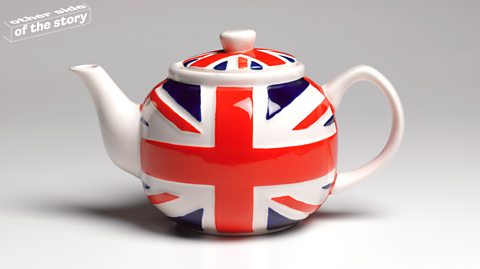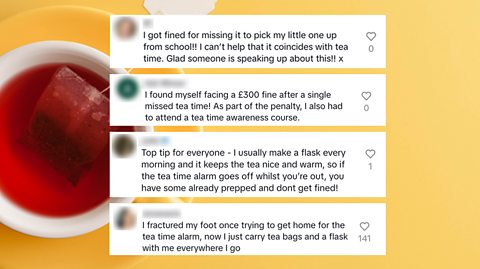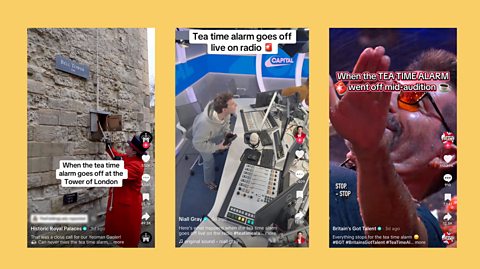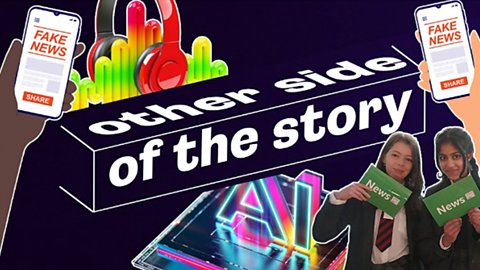
There’s nothing more British than a nice cup of tea, but is it true that a daily alarm reminds Brits to have their brew, or risk facing consequences?
It’s not true!
Whilst Brits are renowned for their love of tea, they’re also known for their dry sense of humour. The whole idea was created to confuse Americans, and is essentially a nationwide prank which has gone viral on socials.
In fact, there are more than 18 million posts on Instagram and more than 600k on TikTok with the hashtag #teatime.

What is the tea time alarm?
The tea time alarm supposedly goes off at the same time every day and signals people to stop what they are doing and drink a cup of English tea. Failure to do so apparently results in a fine from the government.
Why has the tea time alarm gone viral?

Content creators from across the UK have been quick to jump on the trend, sharing their own "stories", with one user commenting, “I fractured my foot once trying to get home for the teatime alarm” and another, “I got fined for missing it to pick my little one up from school!”.
Videos often go viral on TikTok due to algorithms which play a key role in determining which videos get seen by a wide audience. Algorithms use content you like, share, follow and engage with to feed you more of the same content.
On TikTok, this appears on your "For You Page" a personalised feed of videos that the app recommends to you based on your previous activity. This comes from a mix of creators you follow, as well as new creators and trending content that the TikTok algorithm thinks you might enjoy.
Has the tea time alarm fooled Americans?
The viral trend has left some Americans puzzled and sparked huge debate online with many asking, "What happens if you miss the alarm?" and others wondering, "What does it actually sound like?"
One concerned American tourist even asked if they had to partake in afternoon tea during their visit to the UK! While the trend may have caught some off guard, many others have appreciated the British sense of humour, recognising it as nothing more than a joke.
Which videos have had the most views?

With brands like Boots, Greggs, Aldi, and even the UK government jumping on the viral trend, which ones have caused the biggest stir?
Tower of London
Ever wondered who rings the tea time bell? The iconic landmark shared a TikTok featuring a Beefeater ringing the so-called alarm bell. The video received 2.8 million views leading followers to believe the alarm is indeed real. One user commented, "so the tea time alarm really is real!"
Niall Gray
Radio presenter Niall Gray was caught out by the tea alarm during his live radio show on Capital FM. His TikTok video reached 6.4 million views with TikTok UK commenting “Espresso playing whilst the tea alarm goes off is crazy work”.
Britain’s Got Talent
As if drinking tea wasn’t British enough, the popular TV talent show Britain’s Got Talent posted a TikTok where an audition was interrupted by crew members shouting “stop” to ensure Simon Cowell got his tea on time.
When our favourite influencers and brands join in with viral trends, it can lead us to believe everything they do and say. It's always wise to dig deeper and consult reliable sources for additional information to avoid spreading misinformation.
Don’t always believe what you see and read online
It's important to be critical. Remember that not everything you see or read online is true.
Don't take everything face value - just because something appears on your screen or is presented in a catchy headline doesn’t mean it’s accurate or trustworthy.
Always do your own research - verify the information from reliable sources and question the motivations behind what you're being presented with.
Don't fall for clickbait - Headlines will often use emotive language to draw you in. Consider whether it’s actually a matter of interest to you or if you’re just being manipulated into clicking. Stay curious and carry out your own fact-checks to avoid falling for fake news and to make sure that what you’re reading and watching online is accurate and fair.
This article was published in March 2025

Not sure if the news you’re seeing on social media is true or false? Can you always tell if the things you see online are real or fake? Learn how to get the other side of the story with our quizzes, videos and explainers.


